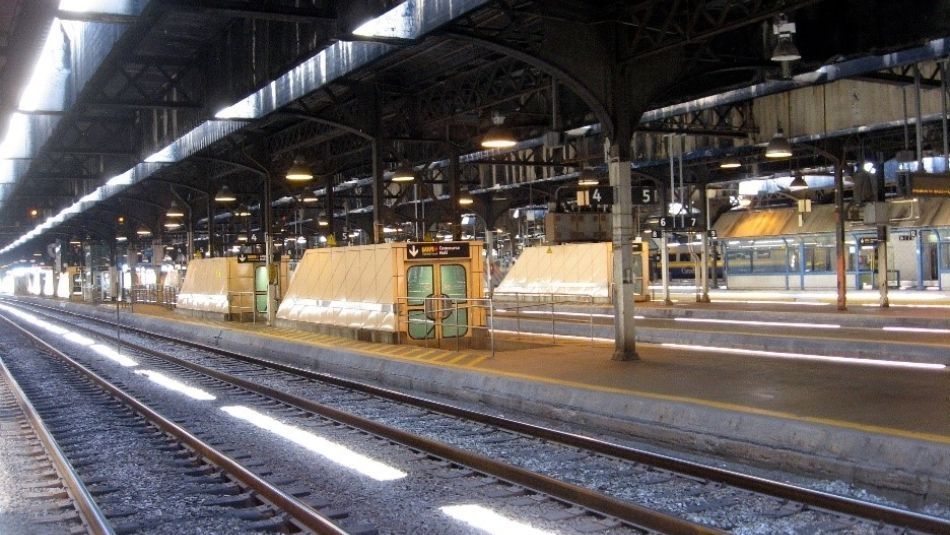
Share
Unifor is fighting back against the tariff war initiated by the United States. Together, we have urged the government to invest in Canada’s rail networks and infrastructure and to enhance regulations in order to safely and efficiently carry goods across the nation into Canadian ports and transportation hubs, and into new markets, to support and build our economy while protecting Canada’s supply chain and jobs.
Unifor’s Rail Industry Council calls on governments and policymakers to take the following actions to support our fight against unjust U.S. tariffs, and to bolster our supply chain and economy:
Diversify Export Markets
The diversification of Canada's export markets will require the building of new export capacity that connects rail to marine transport, road, and multi-modal transfers, and intermodal hubs.
Raw materials requiring bulk export capacity will also need Made-in-Canada research to ensure quality control, emissions standards, and safety.
Canada’s procurement program has to be altered to support value added production across Canada's long distance supply chains.
Develop infrastructure and East, West, and North trade
The main obstacle to moving goods East-West-North, according to Statistics Canada's recent study on inter-provincial trade, is the distance. Planning travel across different modes of travel in Canada should be made easier through government investment in infrastructure and standardized data platforms for industry and people moving.
Invest in tank cars that meet safety standards for the East-West transportation of oil, gas, and energy products
Rail can move oil products, but capacity along rail routes that do not enter the USA cannot currently fill the full demand for energy feed stocks in Sarnia and Montreal energy systems in the short and medium terms.
Tank cars, such as the new TC-117 class, that meet new safety specifications would need building along with other commercially viable transport options to avoid travel through the USA of these products.
These transport options must meet new safety standards and at a sustained level of regulation on inspection and maintenance.
Update inter-switching regulations
Regulations that allow the free movement of American companies along our rail lines through extended inter-switching should be cancelled.
Prioritize inter-provincial passenger transport
The government must prioritize public passenger transport options. Short-term public passenger rail solutions involve expanding production of made in Canada transport products supported through government procurement.
The government needs to build new parallel freight and passenger rail lines.
Transport Canada must ensure trains, buses, marine, and aviation technology is tested in Canada at National Research Council facilities before operation and ensure that the new technology can be maintained and inspected in Canada.
The government should build infrastructure connecting all modes of passenger transport at central nodes, coordinated at the provincial level.
One example of innovation in the sector lead by government is Montreal's investment in a data hub and app that enables easier planning of travel across the city focused on multi-modal travel. The app connects private car share to the rest of the public infrastructure for passenger movement. Proving information to the public to plan routes and connect passengers to different transport options is essential to expand efficient travel in Canada.
Bolster Supply Chain resilience
The government must support public transport data collection and centralization on capacity utilization across firms. This is a good opportunity to rebuild in-house capacity and support investment through building resilience across domestic supply chains.
The Canadian transport sector is very dependent on American government research, on everything from safety to best practices. With the collapse of the regulatory regime in the U.S., the Canadian government must create made for Canada industrial research to replace what has been lost.
Expanding industrial research in the rail sector will support commercial activity in Canada. Data and smart regulations will increase speed, diversity of options, resiliency to Canadian weather/climate change, safety, and lower costs only come from larger research and data sharing programs dealing with specific issues faced in Canadian logistics services.
Enhance labour and worker protections
Labour protections and unions are crucial for supply chain security and resiliency.
Laying out a process for setting wage floors, enabling sectoral bargaining, and eliminating mis-classifications issues for delivery and trucking sectors will reduce wage suppression and casualization that only supports large US company profits.
Workers' rights and unions are entirely missing from current Canadian government supply chain strategies. Establishing sovereignty over regulations in Canada requires establishing a fair and standard framework for operations in Canada.
Free and fair collective bargaining helps establish the working conditions and wages needed to attract high skilled labour to these sectors, keeping money in Canada.
About the Rail Council
Unifor’s Rail Council represents the local Unions, bargaining units and nearly 10,000 railway workers across Canada’s freight and passenger railways, from on-board staff and ticket agents, skilled trades workers that inspect and maintain railcars and locomotives, and members who manufacture freight car, locomotive and track components. Our members play a critical role in the safe transportation of goods, and passengers through out Canada.


